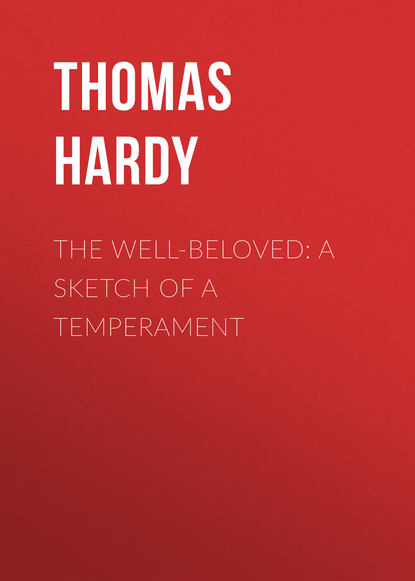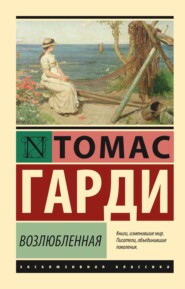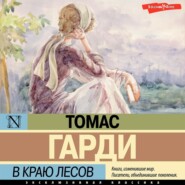По всем вопросам обращайтесь на: info@litportal.ru
(©) 2003-2025.
✖
The Well-Beloved: A Sketch of a Temperament
Настройки чтения
Размер шрифта
Высота строк
Поля
The widow thought that the second Avice might probably not have rejected Pierston on that occasion in the London studio so many years ago if destiny had not arranged that she should have been secretly united to another when the proposing moment came.
But what had come was best. ‘My God,’ she said at times that night, ‘to think my aim in writing to him should be fulfilling itself like this!’
When all was right and done, what a success upon the whole her life would have been. She who had begun her career as a cottage-girl, a small quarry-owner’s daughter, had sunk so low as to the position of laundress, had engaged in various menial occupations, had made an unhappy marriage for love which had, however, in the long run, thanks to Jocelyn’s management, much improved her position, was at last to see her daughter secure what she herself had just missed securing, and established in a home of affluence and refinement.
Thus the sick woman excited herself as the hours went on. At last, in her tenseness it seemed to her that the time had already come at which the household was stirring, and she fancied she heard conversation in her daughter’s room. But she found that it was only five o’clock, and not yet daylight. Her state was such that she could see the hangings of the bed tremble with her tremors. She had declared overnight that she did not require any one to sit up with her, but she now rang a little handbell, and in a few minutes a nurse appeared; Ruth Stockwool, an island woman and neighbour, whom Mrs. Pierston knew well, and who knew all Mrs. Pierston’s history.
‘I am so nervous that I can’t stay by myself,’ said the widow. ‘And I thought I heard Becky dressing Miss Avice in her wedding things.’
‘O no – not yet, ma’am. There’s nobody up. But I’ll get you something.’
When Mrs. Pierston had taken a little nourishment she went on: ‘I can’t help frightening myself with thoughts that she won’t marry him. You see he is older than Avice.’
‘Yes, he is,’ said her neighbour. ‘But I don’t see how anything can hender the wedden now.’
‘Avice, you know, had fancies; at least one fancy for another man; a young fellow of five-and-twenty. And she’s been very secret and odd about it. I wish she had raved and cried and had it out; but she’s been quite the other way. I know she’s fond of him still.’
‘What – that young Frenchman, Mr. Leverre o’ Sandbourne? I’ve heard a little of it. But I should say there wadden much between ‘em.’
‘I don’t think there was. But I’ve a sort of conviction that she saw him last night. I believe it was only to bid him good-bye, and return him some books he had given her; but I wish she had never known him; he is rather an excitable, impulsive young man, and he might make mischief. He isn’t a Frenchman, though he has lived in France. His father was a Jersey gentleman, and on his becoming a widower he married as his second wife a native of this very island. That’s mainly why the young man is so at home in these parts.’
‘Ah – now I follow ‘ee. She was a Bencomb, his stepmother: I heard something about her years ago.’
‘Yes; her father had the biggest stone-trade on the island at one time; but the name is forgotten here now. He retired years before I was born. However, mother used to tell me that she was a handsome young woman, who tried to catch Mr. Pierston when he was a young man, and scandalized herself a bit with him. She went off abroad with her father, who had made a fortune here; but when he got over there he lost it nearly all in some way. Years after she married this Jerseyman, Mr. Leverre, who had been fond of her as a girl, and she brought up his child as her own.’
Mrs. Pierston paused, but as Ruth did not ask any question she presently resumed her self-relieving murmur:
‘How Miss Avice got to know the young man was in this way. When Mrs. Leverre’s husband died she came from Jersey to live at Sandbourne; and made it her business one day to cross over to this place to make inquiries about Mr. Jocelyn Pierston. As my name was Pierston she called upon me with her son, and so Avice and he got acquainted. When Avice went back to Sandbourne to the finishing school they kept up the acquaintance in secret. He taught French somewhere there, and does still, I believe.’
‘Well, I hope she’ll forget en. He idden good enough.’
‘I hope so – I hope so… Now I’ll try to get a little nap.’
Ruth Stockwool went back to her room, where, finding it would not be necessary to get up for another hour, she lay down again and soon slept. Her bed was close to the staircase, from which it was divided by a lath partition only, and her consciousness either was or seemed to be aroused by light brushing touches on the outside of the partition, as of fingers feeling the way downstairs in the dark. The slight noise passed, and in a few seconds she dreamt or fancied she could hear the unfastening of the back door.
She had nearly sunk into another sound sleep when precisely the same phenomena were repeated; fingers brushing along the wall close to her head, down, downward, the soft opening of the door, its close, and silence again.
She now became clearly awake. The repetition of the process had made the whole matter a singular one. Early as it was the first sounds might have been those of the housemaid descending, though why she should have come down so stealthily and in the dark did not make itself clear. But the second performance was inexplicable. Ruth got out of bed and lifted her blind. The dawn was hardly yet pink, and the light from the sandbank was not yet extinguished. But the bushes of euonymus against the white palings of the front garden could be seen, also the light surface of the road winding away like a riband to the north entrance of Sylvania Castle, thence round to the village, the cliffs, and the Cove behind. Upon the road two dark figures could just be discerned, one a little way behind the other, but overtaking and joining the foremost as Ruth looked. After all they might be quarriers or lighthouse-keepers from the south of the island, or fishermen just landed from a night’s work. There being nothing to connect them with the noises she had heard indoors she dismissed the whole subject, and went to bed again.
* * *
Jocelyn had promised to pay an early visit to ascertain the state of Mrs. Pierston’s health after her night’s rest, her precarious condition being more obvious to him than to Avice, and making him a little anxious. Subsequent events caused him to remember that while he was dressing he casually observed two or three boatmen standing near the cliff beyond the village, and apparently watching with deep interest what seemed to be a boat far away towards the opposite shore of South Wessex. At half-past eight he came from the door of the inn and went straight to Mrs. Pierston’s. On approaching he discovered that a strange expression which seemed to hang about the house-front that morning was more than a fancy, the gate, door, and two windows being open, though the blinds of other windows were not drawn up, the whole lending a vacant, dazed look to the domicile, as of a person gaping in sudden stultification. Nobody answered his knock, and walking into the dining-room he found that no breakfast had been laid. His flashing thought was, ‘Mrs. Pierston is dead.’
While standing in the room somebody came downstairs, and Jocelyn encountered Ruth Stockwool, an open letter fluttering in her hand.
‘O Mr. Pierston, Mr. Pierston! The Lord-a-Lord!’
‘What? Mrs. Pierston – ’
‘No, no! Miss Avice! She is gone! – yes – gone! Read ye this, sir. It was left in her bedroom, and we be fairly gallied out of our senses!’
He took the letter and confusedly beheld that it was in two handwritings, the first section being in Avice’s:
‘MY DEAR MOTHER, – How ever will you forgive me for what I have done! So deceitful as it seems. And yet till this night I had no idea of deceiving either you or Mr. Pierston.
‘Last night at ten o’clock I went out, as you may have guessed, to see Mr. Leverre for the last time, and to give him back his books, letters, and little presents to me. I went only a few steps – to Bow-and-Arrow Castle, where we met as we had agreed to do, since he could not call. When I reached the place I found him there waiting, but quite ill. He had been unwell at his mother’s house for some days, and had been obliged to stay in bed, but he had got up on purpose to come and bid me good-bye. The over-exertion of the journey upset him, and though we stayed and stayed till twelve o’clock he felt quite unable to go back home – unable, indeed, to move more than a few yards. I had tried so hard not to love him any longer, but I loved him so now that I could not desert him and leave him out there to catch his death. So I helped him – nearly carrying him – on and on to our door, and then round to the back. Here he got a little better, and as he could not stay there, and everybody was now asleep, I helped him upstairs into the room we had prepared for Mr. Pierston if he should have wanted one. I got him into bed, and then fetched some brandy and a little of your tonic. Did you see me come into your room for it, or were you asleep?
‘I sat by him all night. He improved slowly, and we talked over what we had better do. I felt that, though I had intended to give him up, I could not now becomingly marry any other man, and that I ought to marry him. We decided to do it at once, before anybody could hinder us. So we came down before it was light, and have gone away to get the ceremony solemnized.
‘Tell Mr. Pierston it was not premeditated, but the result of an accident. I am sincerely sorry to have treated him with what he will think unfairness, but though I did not love him I meant to obey you and marry him. But God sent this necessity of my having to give shelter to my Love, to prevent, I think, my doing what I am now convinced would have been wrong – Ever your loving daughter, AVICE.’
The second was in a man’s hand:
‘DEAR MOTHER (as you will soon be to me), – Avice has clearly explained above how it happened that I have not been able to give her up to Mr. Pierston. I think I should have died if I had not accepted the hospitality of a room in your house this night, and your daughter’s tender nursing through the dark dreary hours. We love each other beyond expression, and it is obvious that, if we are human, we cannot resist marrying now, in spite of friends’ wishes. Will you please send the note lying beside this to my mother. It is merely to explain what I have done – Yours with warmest regard, HENRI LEVERRE.’
Jocelyn turned away and looked out of the window.
‘Mrs. Pierston thought she heard some talking in the night, but of course she put it down to fancy. And she remembers Miss Avice coming into her room at one o’clock in the morning, and going to the table where the medicine was standing. A sly girl – all the time her young man within a yard or two, in the very room, and a using the very clean sheets that you, sir, were to have used! They are our best linen ones, got up beautiful, and a kept wi’ rosemary. Really, sir, one would say you stayed out o’ your chammer o’ purpose to oblige the young man with a bed!’
‘Don’t blame them, don’t blame them!’ said Jocelyn in an even and characterless voice. ‘Don’t blame her, particularly. She didn’t make the circumstances. I did… It was how I served her grandmother. … Well, she’s gone! You needn’t make a mystery of it. Tell it to all the island: say that a man came to marry a wife, and didn’t find her at home. Tell everybody that she’s run away. It must be known sooner or later.’
One of the servants said, after waiting a few moments: ‘We shan’t do that, sir.’
‘Oh – Why won’t you?’
‘We liked her too well, with all her faults.’
‘Ah – did you,’ said he; and he sighed. He perceived that the younger maids were secretly on Avice’s side.
‘How does her mother bear it?’ Jocelyn asked. ‘Is she awake?’
Mrs. Pierston had hardly slept, and, having learnt the tidings inadvertently, became so distracted and incoherent as to be like a person in a delirium; till, a few moments before he arrived, all her excitement ceased, and she lay in a weak, quiet silence.
‘Let me go up,’ Pierston said. ‘And send for the doctor.’
Passing Avice’s chamber he perceived that the little bed had not been slept on. At the door of the spare room he looked in. In one corner stood a walking-stick – his own.
‘Where did that come from?’
‘We found it there, sir.’
‘Ah yes – I gave it to him. ‘Tis like me to play another’s game!’
It was the last spurt of bitterness that Jocelyn let escape him. He went on towards Mrs. Pierston’s room, preceded by the servant.
‘Mr. Pierston has come, ma’am,’ he heard her say to the invalid. But as the latter took no notice the woman rushed forward to the bed. ‘What has happened to her, Mr. Pierston? O what do it mean?’
Avice the Second was lying placidly in the position in which the nurse had left her; but no breath came from her lips, and a rigidity of feature was accompanied by the precise expression which had characterized her face when Pierston had her as a girl in his studio. He saw that it was death, though she appeared to have breathed her last only a few moments before.

















